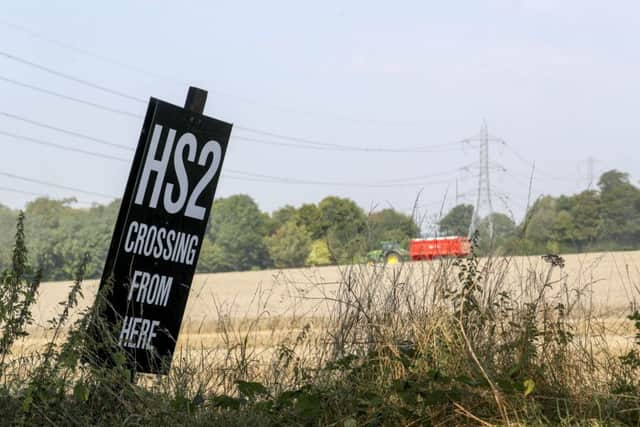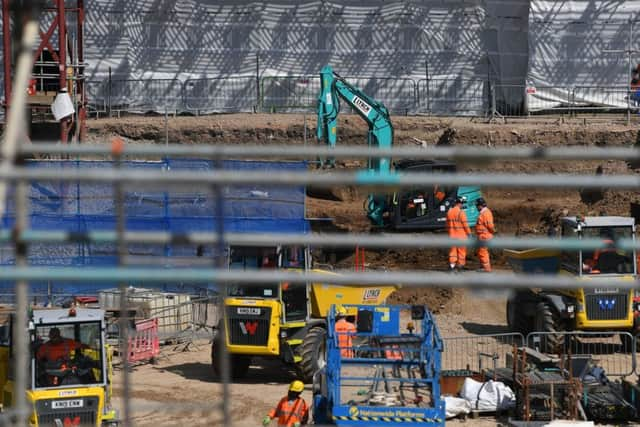Why HS2 must not be a take-it-or-leave-it issue – David Behrens
Take a good look at that date, because it’s now only slightly further away than the completion of the HS2 scheme we have already started, and probably less hare-brained.
The Government’s admission this week that the high speed railway link between London, the Midlands and the North, in that order, would be delayed by up to seven years and run £26bn over budget, was proof if proof were needed that the whole project is a runaway train.
Advertisement
Hide AdAdvertisement
Hide AdWe ought to be used to plans that go off the rails. We persevered with steam when the rest of Europe turned to diesel; we closed down branch lines just before demand for them grew; and now we have backed the wrong horse once more, by putting our money on a project no-one had properly costed and whose consequences had not been considered.


We knew already that HS2’s legacy would be the demolition of large parts of the centre of Leeds, and the bulldozing of communities and countryside. Now comes the confirmation that none of it was ever really feasible in the first place.
The review ordered by Boris Johnson when he took office will likely draw a line under the whole fiasco – yet the arguments are less polarised than you would have guessed from the reactions to this week’s developments.
Advertisement
Hide AdAdvertisement
Hide AdLeeds City Council pointed to the “sound business case” of not stopping HS2 in its tracks. The CBI held out the promise of vast economic benefits across the country.


But it’s not a yes-or-no issue. The question is not whether Britain needs faster trains with increased capacity. Of course it does. It’s a matter of how they should be delivered.
The Department for Transport, in sticking doggedly to its support of the existing scheme – the one on which it staked all our cash – has consistently ignored the fact that it is just one of several on the table.
Advertisement
Hide AdAdvertisement
Hide AdMargaret Hodge, chair of the Commons Public Accounts Committee, spotted this as far back as 2012, when the bets were first placed. Shocking, biased and bonkers were among the adjectives she thew at transport mandarins, as they tried to justify their decision to her.


And just last May, the House of Lords Economic Affairs Committee called for a new assessment of the business case before HS2 could be allowed to proceed. It had, said the peers, “short-changed” the North of England and could not be delivered within its over-generous £55.7bn budget. Not even HG Wells could have forecast that better.
The DfT’s biggest mistake has been its failure to give house room to HS2’s principal rival, a scheme called High Speed UK. Its claims to deliver better connectivity between north and south at a fraction of the cost, with a lower carbon footprint and none of the upheaval, are well-known to the Department, and its refusal to weigh its benefits – and thus acknowledge its errors – is an abrogation of duty.
Its digging-in over this should not be a surprise; it gets so much wrong that going into denial is a reflex action. But the scale of HS2 makes its other misjudgments pale in comparison.
Advertisement
Hide AdAdvertisement
Hide AdFew, for instance, have noticed yet that the new trains it mandated Northern Rail to introduce on some of its commuter lines have fewer seats than the ones they will replace; or that the emerging beige-and-plastic roof on Leeds Station, in which it also had a hand, looks like a design that Habitat rejected in 1973.
No-one can predict what the PM’s review will conclude, or indeed whether we will still have a PM by the time it is delivered. But supporters of the project in boardrooms and Town Halls across the North – those without a vested interest in the taxpayer-funded HS2 management company that pays six-figure salaries to a quarter of its employees – would be well advised to make friends elsewhere if they don’t want to lose the benefits that faster trains will bring. Backing the wrong horse at this late stage could leave them with none in the race.
Binary decisions have not served us well lately. Let’s not make this another case of take it or leave it.